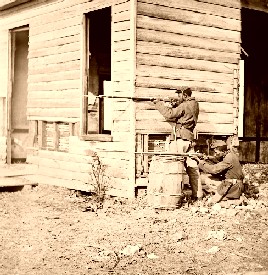"We are not enemies, but friends. We must not be enemies. Though passion may have strained it must not break our bonds of affection. The mystic chords of memory, stretching from every battlefield and patriot grave to every living heart and hearthstone all over this broad land, will yet swell the chorus of the Union, when again touched, as surely they will be, by the better angels of our nature."
-- Abraham Lincoln, March 4, 1861, From His First Inaugural Address. |
|
|
-
An estimated 300 women disguised themselves as men and fought in the ranks.
More than 620,000 people, or two percent of the population, died in the Civil War.
Approximately 6,000 battles, skirmishes, and engagements were fought during the Civil War.
There were over 2,000 boys who were 14 years-old or younger in the Union ranks. Three hundred were 13 years or less, while there were 200,000 no older than 16 years.
At the Battle of Shiloh, on the banks of the Tennessee River, more Americans fell than in all previous American wars combined. There were 23,700 casualties.
At Fredericksburg, Virginia in 1862, the Confederate trenches stretched for a distance of seven miles. The troop density was 11,000 per mile, or six men to the yard.
-
The greatest cavalry battle ever fought in the Western hemisphere was at Brandy Station,Virginia, on June 9, 1863. Nearly 20,000 cavalrymen were engaged on a relatively confined terrain for more than 12 hours.
An Iowa regiment had a rule that any man who uttered an oath should read a chapter in the Bible. Several of them got nearly through the Old Testament.
There were more Northern-born Confederate generals than Southern-born Union generals.
The famous Confederate blockade-runner, the C.S.S. Alabama, never entered a Confederateport during the length of her service.
During the Battle of Antietam, Clara Barton tended the wounded so close to the fighting that a bullet went through her sleeve and killed a man she was treating.
In March 1862, "new” ironclad war ships, the Monitor and the Merrimac battled off Hampton Roads, Virginia. From then on, every other wooden navy ship on earth was obsolete.
There were 100 men in a Company and 10 Companies in a Regiment.
Not fond of ceremonies or military music, Ulysses S. Grant said he could only recognize two tunes. "One was Yankee Doodle, the other one wasn’t."
President Abraham Lincoln was the first president to be assassinated.
-
At the start of the war, the value of all manufactured goods produced in all theConfederate states added up to less than one-fourth of those produced in New York State alone.
In 1862, the U.S. Congress authorized the first paper currency, called "greenbacks."
Oliver Wendell Holmes, Jr., future chief Justice, was wounded three times during theCivil War: in the chest at Ball’s Bluff, in the back at Antietam and in the heel atChancellorsville
Surgeons never washed their hands after an operation, because all blood was assumed to be the same, nor did he wash his instruments
Confederate Private Henry Stanley fought for the Sixth Arkansas, and was captured at Shiloh, but survived to go to Africa to find Dr. Livingston.
On July 4, 1863, after 48 days of siege, Confederate General John C. Pemberton surrendered the city of Vicksburg, Mississippi to Union General, Ulysses S. Grant. For the next 81 years, the city Vicksburg, Mississippi did not celebrate the Fourth of July.
Disease killed twice as many men during the war than did battle wounds.
The 12th Connecticut Regiment entered the war with a compliment of 1,000 men. Before it entered its first engagement, sickness had reduced its strength to 600 able bodied soldiers.
On both sides of the conflict, potential recruits were offered monetary rewards, or "bounties," for enlisting, as much as $677 inNew York. "Bounty jumping” soon became so popular, that hundreds of men signed up, and then deserted, to enlist again elsewhere.
For those who were drafted, the law allowed them to pay a substitute to go in their place. Another type of "bounty jumper” was born when men would hire out to more than one draftee and then make a hasty exit once they were paid. The record for bounty jumping was held by John O’Connor, who admitted to hiring himself out 32 times before being caught. He received a 4 year prison term.
|
Though African Americans constituted less than one percent of the northern population, by the war’s end made up ten percent of the UnionArmy. A total of 180,000 black men, more than 85% of those eligible, enlisted. By the time of the Confederate surrender in 1865, there were more African Americans in the Union army than there were soldiers in the Confederate army.
In November 1863, President Lincoln was invited to offer a "few appropriate remarks" at the opening of a new Union cemetery at Gettysburg. Though Lincoln spoke just 269 words in his Gettysburg address, the main speaker, an orator from Massachusetts, spoke for nearly two hours.
Confederate General Nathan Bedford Forrest had 30 horses shot from under him and personally killed 31 men in hand-to-hand combat. "I was a horse ahead at the end," he said.
|
|





No comments:
Post a Comment